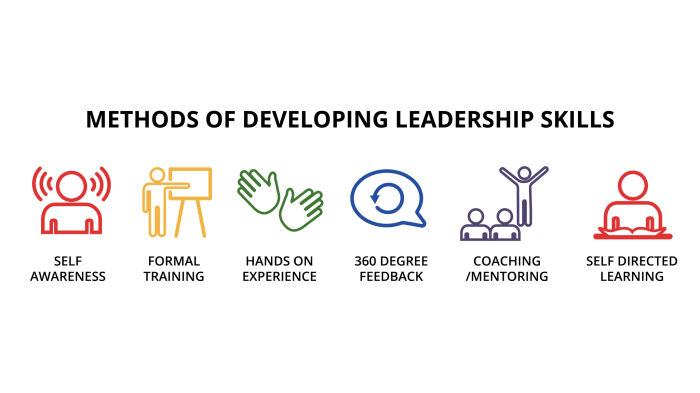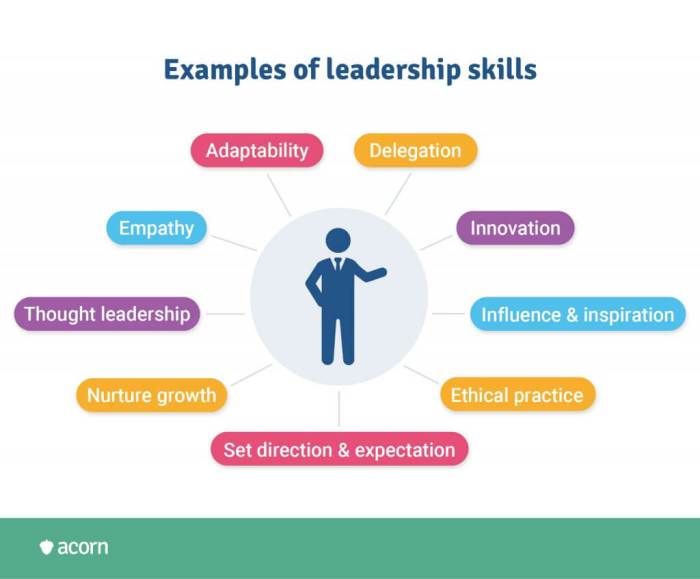Developing Leadership Skills is the key to unlocking doors in both personal and professional realms, empowering you to lead with confidence and impact. As we delve into the art of leadership, prepare to embark on a journey of growth and transformation.
From honing essential skills to overcoming challenges, this guide will equip you with the tools needed to excel as a leader in any setting.
Importance of Developing Leadership Skills

Developing leadership skills is crucial in both personal and professional life as it helps individuals effectively communicate, inspire, and motivate others towards a common goal. These skills are essential for guiding teams, resolving conflicts, and making strategic decisions.
Positive Impact on Team Dynamics and Productivity
- Effective leadership skills can foster a positive work environment where team members feel supported, valued, and motivated to perform at their best.
- Strong leadership can improve communication within the team, leading to better collaboration, idea sharing, and problem-solving.
- Leaders who can inspire and empower their team members often see increased productivity and higher levels of job satisfaction among their employees.
Contribution to Career Growth Opportunities
- Individuals with strong leadership skills are often sought after for management positions and leadership roles within organizations.
- Leadership abilities are highly valued by employers as they indicate the potential to drive innovation, lead teams to success, and achieve organizational goals.
- Developing leadership skills can open doors to new career opportunities, promotions, and increased responsibility in the workplace.
Key Leadership Skills to Develop
Developing key leadership skills is essential to becoming an effective leader. These skills are crucial in guiding and inspiring a team towards success. Let’s explore some of the most important leadership skills to develop:
Communication
Effective communication is the cornerstone of strong leadership. Leaders must be able to clearly convey their ideas, listen actively to their team members, and provide feedback in a constructive manner. In real-life scenarios, strong communication skills can help resolve conflicts, inspire motivation, and foster a positive work environment.
Decision-Making
The ability to make timely and well-informed decisions is a critical leadership skill. Leaders must evaluate all available information, consider the potential outcomes, and choose the best course of action for the team. In challenging situations, strong decision-making skills can help navigate uncertainty and lead the team towards achieving their goals.
Problem-Solving, Developing Leadership Skills
Leaders often face complex challenges that require creative problem-solving skills. By analyzing the root cause of a problem, generating innovative solutions, and implementing effective strategies, leaders can overcome obstacles and drive progress. Real-life examples demonstrate how strong problem-solving skills contribute to overcoming adversity and achieving success.
Emotional Intelligence
Emotional intelligence is the ability to understand and manage emotions, both in oneself and in others. Leaders with high emotional intelligence can empathize with their team members, build strong relationships, and navigate interpersonal dynamics effectively. In various scenarios, emotional intelligence plays a crucial role in fostering collaboration, resolving conflicts, and creating a supportive work environment.
Strategies for Developing Leadership Skills
Developing leadership skills requires a proactive approach and a willingness to learn and grow. There are various strategies individuals can utilize to enhance their leadership abilities, ranging from mentorship programs to setting achievable goals.
Mentorship Programs
Mentorship programs provide valuable guidance and support from experienced leaders in a particular field. By seeking mentorship, individuals can learn from the experiences and insights of others, gaining valuable knowledge and skills to improve their own leadership capabilities.
Leadership Workshops
Attending leadership workshops and seminars can offer opportunities to learn new strategies, techniques, and best practices for effective leadership. These events often provide a platform for networking with other professionals and gaining fresh perspectives on leadership development.
Role-Playing Exercises
Engaging in role-playing exercises can help individuals practice and refine their leadership skills in a simulated environment. By stepping into different leadership roles and scenarios, individuals can develop their communication, decision-making, and problem-solving abilities in a safe and controlled setting.
Seeking Feedback
Feedback from peers and mentors is essential for improving leadership capabilities. Constructive criticism and insights from others can help individuals identify areas for growth and make necessary adjustments to their leadership style. Embracing feedback as a learning opportunity can lead to significant leadership development.
Setting Achievable Goals
Setting specific, measurable, achievable, relevant, and time-bound (SMART) goals is crucial for leadership growth. By establishing clear objectives and milestones, individuals can track their progress, stay motivated, and continuously work towards enhancing their leadership skills.
Creating a Personal Development Plan
Developing a personalized plan for leadership growth can provide a roadmap for continuous improvement. By outlining specific actions, timelines, and resources needed to achieve leadership goals, individuals can focus their efforts effectively and make meaningful strides in their development journey.
Challenges in Developing Leadership Skills

Developing leadership skills can be a challenging journey, often requiring individuals to overcome various obstacles along the way. These challenges can range from internal struggles like self-doubt to external factors such as conflicts within a team.
Overcoming Self-Doubt
Self-doubt can hinder one’s ability to lead effectively, as it can lead to indecision and lack of confidence. To overcome self-doubt, individuals can practice self-affirmation, seek feedback from others, and focus on their strengths rather than weaknesses.
Managing Conflicts Within a Team
Conflicts within a team can be detrimental to a leader’s effectiveness, as they can create a toxic work environment and hinder productivity. To overcome this challenge, leaders can facilitate open communication, promote collaboration, and implement conflict resolution strategies to address issues effectively.
Resilience and Adaptability
Resilience and adaptability are key traits that play a crucial role in overcoming obstacles on the path to becoming a better leader. Leaders who are resilient can bounce back from setbacks and challenges, while those who are adaptable can adjust to change and navigate unexpected circumstances with ease.
